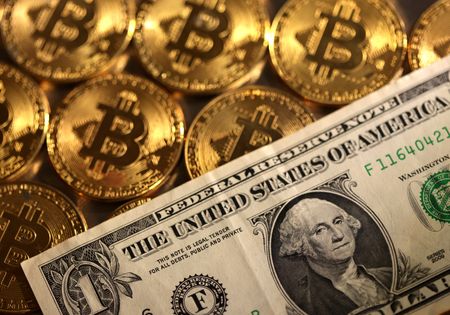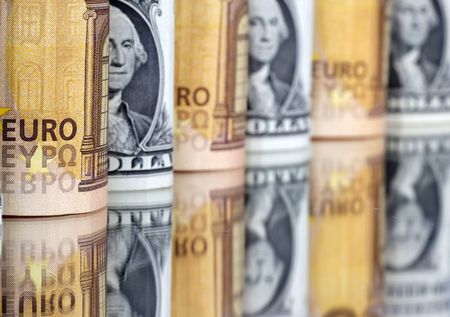By Gertrude Chavez-Dreyfuss
NEW YORK (Reuters) -The U.S. dollar advanced on Thursday, boosted by data showing hotter-than-expected producer prices last month and fewer people seeking unemployment claims, which suggested that the Federal Reserve could reduce the number of rate cuts this year.
The dollar index, which gauges the currency against six major peers, rose in three of the last four sessions. It was last up 0.6% at 103.36. For the week, the index was up 0.6%, on pace for its largest weekly gain since mid-January.
Data on Thursday showed the U.S. producer price index for final demand rose 0.6% in February after advancing by an unrevised 0.3% in January. Economists had forecast the PPI climbing 0.3%.
In the 12 months through February, the PPI surged 1.6% after advancing 1.0% in January. The report followed data on Tuesday that consumer prices increased strongly for a second straight month in February.
A separate report from the Labor Department was also better than expected, showing that U.S. initial claims for state unemployment benefits fell 1,000 to a seasonally adjusted 209,000 for the week ended March 9. Economists had forecast 218,000 claims in the latest week.
“The price action proves the point that people were not positioned for how strong everything (U.S. data) was this morning,” said Erik Bregar, director of FX and precious metals risk management, at Silver Gold Bull in Toronto.
“The thinking now is that: what could the Fed say dovishly next week? If anything, they could be on the hawkish side.”
The Fed’s current dot plot, or the central bank’s interest rate forecast, showed three rate cuts for 2024, although that was released back in December. U.S. inflation numbers since then have been sticky, while the labor market remained tight.
The U.S. central bank’s policy meeting is set to run from March 19-20 and while the market is not expecting any change in interest rates, investors will be closely watching for revisions to the dot plot.
U.S. rate futures have pared back the chances of a rate cut at the June meeting to 60%, from about 67% late on Wednesday, according to LSEG’s rate probability app. For 2024, the market is now pricing in less than three rate cuts, down from between three to four roughly two weeks ago.
Another piece of data on Thursday showed some deceleration in spending. U.S. retail sales rose 0.6% last month and the numbers for January were revised lower to show sales tumbling 1.1% instead of 0.8% as previously reported.
Economists polled by Reuters had forecast retail sales in February, which are mostly goods and are not adjusted for inflation, rising 0.8%.
The retail sales report, however, has not dented the market’s growing conviction that the Fed’s rate-cutting cycle will be gradual.
Elsewhere, the Bank of Japan started to make arrangements to end its negative interest rate policy at the March 18-19 meeting, Jiji news agency reported. The yen firmed against both the dollar and euro after the report but it has since weakened versus the greenback.
Preliminary results of Japan’s spring wage negotiations are due on Friday, with several of the country’s biggest companies having already agreed to meet union demands for pay increases.
The dollar was last up 0.4% versus the yen at 148.29 yen, while the euro stayed lower against the Japanese unit, down 0.3% at 161.35.
In other currencies, the euro dropped 0.6% to $1.0884. There was no major European economic data on Thursday.
Sterling fell as well versus the dollar, sliding 0.4% to $1.2745.
In cryptocurrencies, bitcoin fell more than 5% after earlier hitting a record $73,803. It was last at $69,381. Exchange-traded bitcoin funds and optimism that the Fed will cut interest rates this year have boosted the biggest cryptocurrency to repeated record peaks.
(Reporting by Gertrude Chavez-Dreyfuss; Additional reporting by Harry Robertson in London and Brigid Riley in Tokyo; Editing by Elaine Hardcastle, Sharon Singleton and Lisa Shumaker)

